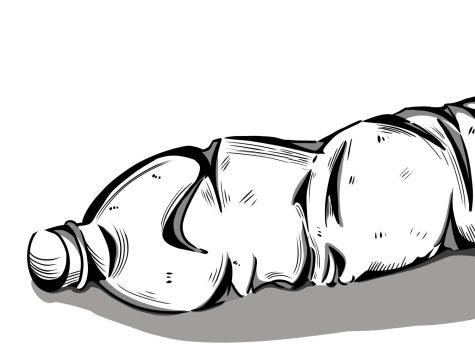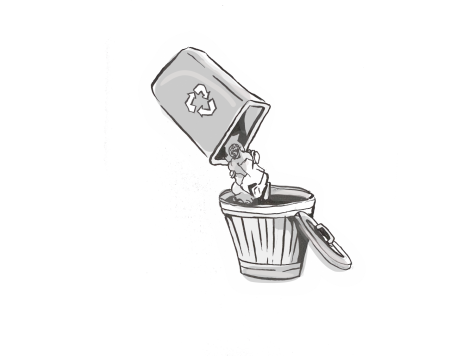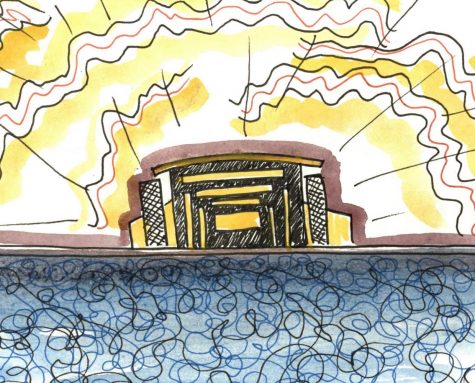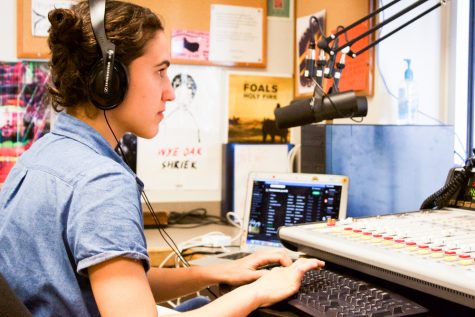Reducing Waste One Plastic Container at a Time
April 18, 2019
The phrase “zero waste” can be an intimidating phrase for those with a desire to become more eco-friendly or green in their lives. Thinking about the waste that the average person goes through in a single day makes it seem like an insurmountable task to completely cut that waste to zero. However, by attempting to simply do the best you can rather than obtaining waste free perfection can make eco-friendly choices more accessible to a wider range of people.
What is a Zero Waste lifestyle?
Zero Waste, a term that has become popular recently through social media, is all about changing the way we consume and dispose of materials within our lives to create the least plastic waste as possible. While the term may imply that no waste is produced whatsoever, living a zero waste lifestyle for most people is all about reducing their waste production as much as possible and properly disposing of the waste that is produced through composting, reusing materials, and recycling if needed.
Kaeley Pilichowski, a senior at Whitman, has been working on reducing the waste she produces in her life for the last few years.
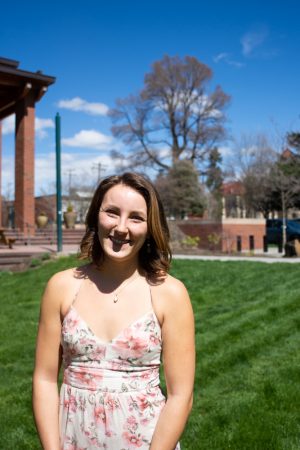
Kaeley Pilichowski is a Whitman senior who is passionate about living in a zero waste lifestyle.
For Pilichowski she was inspired to take this step through seeing people who were similar to her in lifestyle live a waste free life. She was particularly inspired by Lauren Singer, an Instagram influencer and owner of Package Free Shop who is known for producing a single jar of plastic waste a year.
“Seeing Lauren Singer for me was like wow here’s a successful business woman, she still wears really cute clothing, she still wears makeup” Pilichowski explained. “She can still do things like that. I think she makes her own mascara or she might buy it from a sustainable brand. It was just nice to see someone who lived this kind of a lifestyle, but was still a normal human being in a lot of ways. I saw her and was like this is really awesome.”
While finding inspiration in a relatable figure through social media is often helpful in inspiring people to reduce their waste, most Instagram zero waste figures are white middle class women.
Why is it important?
Each person has their own motivations and beliefs for reducing waste within their life. For some it may be their love for nature or a specific ecosystem, for others it may be for health reasons, but an essential piece of this choice is recognizing the way our lifestyle has a large effect on not only the earth but the people who live on it.
For Pilichowski, she believes that when considering climate change and our impact on the earth it is important to recognize that our lifestyles and consumption effects far beyond the direct impact that we can see.
“People aren’t thinking about the urgency of it because they’re not necessarily seeing or thinking about the effects all the time, but there are communities out there who their properties are slowly shrinking because sea levels are rising and for them that is such a big problem and an apparent issue” said Pilichowski.
For junior Abbey Dias, who has attempted to make more eco friendly decisions in her life from shopping in bulk to reusing reusable straws and utensils, her eco friendly choices are rooted in her love for the ocean.
“A lot of my motivation behind the way that I live and reducing my impact is based on taking care of the ocean. That’s my passion and that’s why I do what I do. It’s really hard being in Walla Walla because we’re so far away from the ocean and it’s like how can what I do make an impact on the ocean which is so far away and it’s so big” said Dias.
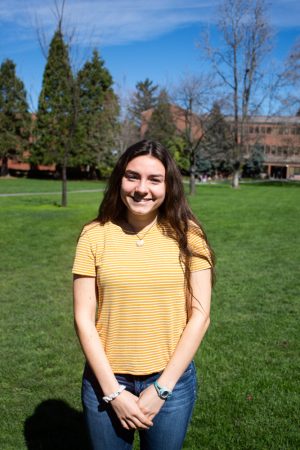
Junior Abbey Dias has worked to limit her environmental impact and has encouraged local businesses to ditch straws.
While the problem of climate change can seem too big for one individual to fix or make an impact, Pilichowski believes that taking simple steps to reducing your waste can have large impacts on the earth.
“I’m a firm believer in that a consumer can still make appropriate choices that can affect things. I know a ton of people say ‘oh your one thing isn’t going to make a difference’, but I’m like well why are people vegetarian or why do people try to consciously consume? If it’s really not doing anything then why is it a movement because it does make sense, if people stop consuming something they’re gonna have to produce less or it’s going to become more expensive to produce it. There is going to be pressure” said Pilichowski.
As much as she believes that individuals can make a difference in the environment, she also points out that within the structure of capitalism being totally eco-friendly is near impossible. She cites a environmental sociology term called Treadmill of Production for this idea.
“Treadmill of Production is the idea that capitalism will never be green and that corporate’s number one interest is always making a profit. It’s never in their best interest to be environmentally friendly and the only way they will change is if there is social, political, or economic pressures” Pilichowski explained. “In my opinion people need to be that social, political, or economic pressure. They need to make it clear that they will not compromise their health or the health of the environment or whatever over these giant corporations making money.”
Within the confines of capitalism large corporations thrive on creating a culture of a constant need for new products.
“There’s always going to be corporations that want the consumer to feel that they want something and feel like they need it to be happy and survive, but I’ve actually found so much more happiness in going back to the roots of how things are made. Like I really want to learn to make my own wooden spoons. Like that’s awesome” said Pilichowski.
While it is not in the foreseeable future that capitalism will dismantled, Pilichowski explained that there are ways that individuals can work within the system.
“What I constantly try to remind myself is to not consume more. Like I have a great utensil set that I love and that I don’t need another one. And to remember the things that you own. Accepting and loving the things that you own and appreciating the things that you have and trying to stop consuming unless you think that it’s really necessary or it would really make you happy in one way,” said Pilichowski.
How to be low waste:
Attempting to adopt a zero or reduced waste lifestyle can be an intimidating step to take. Looking at the large amount of waste that is created just from a typical trip to a grocery store or our daily hygiene needs, it can be hard to visualize how to find alternatives to these products which are usually packaged in plastic, glass or metal.
After learning more about plastic and its effect on the environment Pilichowski decided that she was interested in attempting to reduce the waste she produced in her own life. Rather than immediately throwing away all of her products and possessions made from plastic, she made a gradual transition to a plastic free life.
“I worked through things as I used things up. Of course everyone wants to jump on the train immediately and buy all these things and I bought a bunch of things, but then I tried to phase things out. I was like this feels super counter intuitive if I’m just throwing this stuff away to be waste free” Pilichowsi said.
For both Pilichowski and Dias, one concrete first step they could take was to attempt to buy foods with the least amount of plastic packaging as possible. Some steps that can be taken to reduce plastic waste while shopping includes bringing reusable cloth bags for produce and shopping in bulk.
“A lot of people when they’re buying vegetables and things they put it in plastic bags because they might be wet or for whatever reason. So I just skip that plastic bag altogether and stick all my fruits and vegetables in this netted produce bag that I have. If I forget my reusable bags, which happens quite often, I will take the plastic shopping basket to my car and dump everything in my car and then bring it back so I don’t have to use a bag” Dias explained.
Grocery stores such as Andy’s Market in College Place have a variety of food items from flour and oats to snacks in large containers. The consumer can then bring their own containers to put the desired amount of food in. This method of shopping reduces both plastic and food waste.
“I was really surprised Walla Walla even has bulk stores. If people can make it to Andy’s, Andy’s technically is almost entirely a bulk store,” said Pilichowski. “Andy’s is also really amazing because they care so much about local produce. We are so lucky to be in a place where we are surrounded by farms and the fact that Andy’s is a very community based store and they really care about it. And the fact that we are near a community where that is so important, like for Seventh Day Adventists that is so important so that’s awesome.”
While bulks shopping is a great way to reduce plastic it can be hard to find all desired goods in this form and can be time consuming. Pilichowski said that she does buy food in packaging that she cannot otherwise find unpackaged, but she tries to find these goods in metal or glass containers.
“I don’t really believe recycling of plastic is the answer because you can only recycle plastic so many times and a lot of places won’t accept a lot of the plastics and you’re just continuing to make more plastic things. It’s almost like an excuse. It’s like ‘oh well if we can recycle we can just continue to create massive amounts of plastic.’ And for me I don’t think that’s the answer. You can literally melt glass down and reform glass into something or you can literally melt metal and make it into something else. You can literally take that thing to its basic form and make it into something else again. While with plastic you can kind of do that, but it will never be able to be anything natural ever again” said Pilichowski.
Shopping in bulk and being conscious of your choices as a consumer, according to Dias, is something that takes planning ahead. The time and preparation that it takes to live this lifestyle may not be accessible to all, but Dias feels that she has benefited from this increased awareness.
“A lot of it has to do with planning ahead which is really kind of a lifestyle change, how you think and how you plan ahead. This has really benefited me in a lot of areas other than just being eco friendly. It’s how do you plan ahead and how do you know what you need and prepare for that? If you go to the grocery store after class you really have to be on top of bringing your bags and stuff with you” said Dias.
Afton Weaver, a Whitman junior currently studying abroad in Munich, Germany, noted that as she has tried to reduce plastic waste in her life she has been able to think more critically about the choices she is making as a consumer.
“The product might be organic and not be wrapped in plastic, but it might also have been transported thousands of miles and previously wrapped in plastic meaning its carbon footprint is a lot bigger than what it seems” said Weaver.
Making a Reduced Waste Lifestyle Accessible:
While living a zero waste lifestyle can have a positive effect on the environment it is important to note that this lifestyle is inaccessible for many people for varying reasons. As a time intensive process going reduced waste does not fit into every lifestyle, and it can often be more expensive to buy products that are eco friendly or package free.
“Because it should always be about accessibility too because ultimately how are you going to reach so many people in the smallest things if you aren’t thinking about what’s accessible and what’s available for everyone” said Pilichowski.
Pilichowski hopes that if those who are able to fight for corporations to reduce their use of unnecessary plastic and make eco friendly products more price accessible in time a reduced waste lifestyle could be something more accessible to all.
For Dias she believes that simply being aware of the way we impact our earth and doing what you can in your own way to reduce your impact is an important exercise that in the end can make us kinder people.
“I think being really eco-aware is kind of a model for being kind because you have to really look at yourself and how you are influencing the environment and the people around you and you need to realize that you should only take what you need and what is necessary,” said Dias. “ I think that’s really an act of kindness because you’re leaving room for other people and you’re being kind to the environment because you’re only taking what you need and you’re not using just tons of garbage and trash and things and being a huge consumer of things, but you’re recognizing what you’re impact is and that is a really big shift in mindset from how does everything in this life impact me, you’re thinking about how do I impact the things around me and I think that people start to realize that and if people start to make changes that minimize their impact on their surroundings people will ultimately become kinder to each other and realize that it’s not all about you, but it’s about leaving room for other people and leaving room for the environment’s success.”





